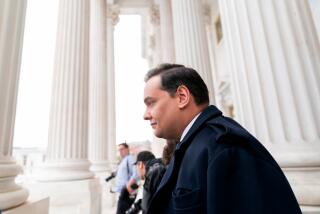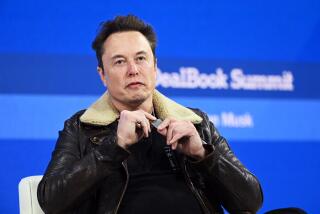Window on New Image of ‘Statesman’ Bill Gates
- Share via
He’s nerdy-looking, awkward, often unshaven and has been known to spray you when he talks. Hardly the kind of guy you’d choose to do lunch with.
Except his name is Bill Gates. And in spite of his quirks, or perhaps because of them, the youthful chairman of mighty Microsoft Corp. has become the stuff of corporate legend, a cultural figure so closely watched that his 1987 breakup with a girlfriend was emblazoned across the supermarket tabloid the Star.
In the past week, as Microsoft was reaching out to a broader market to sell Windows 95, Gates has masterfully leveraged his celebrity in hawking his new software. Never press-shy, he’s brought media hype to a new level, marching through interviews with the morning news programs, chatting it up with Larry King and dispensing sought-after sound bites to news crews camped around Microsoft’s Redmond, Wash., headquarters.
Though Gates doesn’t appear in the company’s TV commercials, he is front and center on the promotional circuit, sharing his spotlight with the product that could enshrine him as the true captain of the Information Age.
In the process, Gates’ image has morphed from computer nerd to something closer to that of an average guy. The same huffy mogul who angrily walked out on Connie Chung a year ago appeared on TV this week playfully demonstrating a flight simulator game.
Gates’ appearance has improved too. His typically tousled hair is neater, and he’s dumped his rumpled look for pressed slacks and clean shirts. Though the company’s dress code is casual, Gates turned up at important functions wearing well-tailored suits.
People close to Gates say his transformation is due in part to the fact that the billionaire boy wonder has grown up; he’s nearly 40 and got married a year ago. But, they say, there’s more to it than onset of middle age. Gates, they say, understands that his company’s image is closely linked to his own.
As Microsoft moves into consumer products, ranging from CD-ROMs to computer games, Gates must shed the reputation for arrogance and impatience that made him a hero in the geek world, because such traits could alienate consumers. As his image becomes more accessible, the reasoning goes, so does his company and its products.
Even before Windows 95 hit the market this week, Gates had taken steps to reach out to a broader marketplace. He writes a column that appears in newspapers in the United States and abroad, and during the holidays last year, he invited a foreign news crew to the headquarters to extend New Year’s greetings.
In softening his image, Gates has become a billionaire that people can identify with, in part because he seems so average.
“You listen to him and he sounds like someone who plays third base for the Padres,” said Michael Gaffney, managing partner of the Baltimore advertising and public relations agency Earle Palmer Brown. “It’s fascinating that people can identify with someone who is richer than God.”
Of course, little about Gates is average. Scion of a wealthy and prominent Seattle family, he attended private schools and Harvard. He dropped out 20 years ago to found Microsoft with boyhood friend and computer whiz Paul Allen. Forbes ranks him as the world’s wealthiest person. He has a net worth of more than $12 billion.
He rubs elbows with the rich and famous--a meeting with rock singer Sting, a photo shoot with basketball star Shaquille O’Neil, doing a deal with producer Steven Spielberg. His name comes up continually when entertainment properties go on the block.
Though he moves in the social and corporate stratosphere, consumers can relate to him because there is a perception that good timing and luck played a role in his success, said Nancy Ellen Talburt, associate vice chairman for academic affairs at the University of Arkansas and president of the International Popular Culture Assn.
“He developed something beyond what most people can imagine, but his success is so huge, it’s kind of like winning the lottery,” she said. “Though what he achieved is very complex, winning the lottery is something anyone can do.”
Gates’ make-over comes as his company takes a more consumer-friendly approach, signaled by the hiring of Robert J. Herbold from Procter & Gamble and the launch last November of the company’s first corporate image advertising. People close to Gates say he is changing his image on his own, instinctively realizing that the smudged eyeglasses that endeared him to nerds don’t cut it with families thinking about buying software.
Marketing executives say the transformation is far from complete, though. In a commercial for Coca-Cola scheduled to air this weekend, Gates, despite coaching, turns in a bland 30-second performance. As an interview subject, “he’s just awful,” says advertising executive Gaffney, who says Gates came off as colorless in his recent round of TV appearances.
The glow around Gates dims within the technology industry, where he is regarded as a ruthless competitor and a copycat. His first operating system was purchased from the inventor, and some say his much-heralded Windows 95 was inspired by Apple Computer Inc.’s Macintosh.
At work Gates often engages in shouting matches with fellow executives, a style of discussion that has become a basic element of Microsoft culture. He is known to call employees stupid to their faces. He has reduced executives to tears when they didn’t perform up to expectations during meetings. He doesn’t suffer fools.
But those tendencies sometimes hurt him in his role representing Microsoft to the outside world.
In 1993, when the Federal Trade Commission was investigating Microsoft trade practices for potential antitrust activity, Gates went to Washington to lobby. He reportedly got into heated arguments with the commissioners and at one point accused Dennis Yao, a soft-spoken ex-Wharton business school professor, of having “socialistic ideas.” The FTC ultimately deadlocked without moving against Microsoft. The company remains the target of a Justice Department antitrust investigation.
Ray Noorda, chairman of rival group Novell Inc., once described dealing with Gates this way: “To have a heart-to-heart with someone, you need two hearts.”
Around Microsoft, there is clearly a conscious effort to polish Gates’ image. Microsoft spokesmen talk of Gates’ emergence as a “statesman.” Earlier this year, for example, he met the Chinese prime minister in a much publicized trip to Beijing. And, with a Microsoft colleague, he is working on a book, “The Road Ahead,” which is expected to enhance his role as visionary.
Toward that end, he has taken his message on the road, appearing before such groups as the Economics Club of Chicago. There Gates gave what public relations executive Paul Rand called “a pretty generic presentation” on the role of the computer in daily life.
Rand, a senior vice president with Golan/Harris, was disappointed with the message but not the messenger. He said he went to have a look at him--”to see someone who is truly impacting our lives.”
Though Rand’s firm has orchestrated thousands of similar events, the executive saved the program as a souvenir for his children--a bit of history, he said. “He is the visionary and spokesman for the whole computer movement,” Rand said. “It’s like seeing Andrew Carnegie or Henry Ford.”






